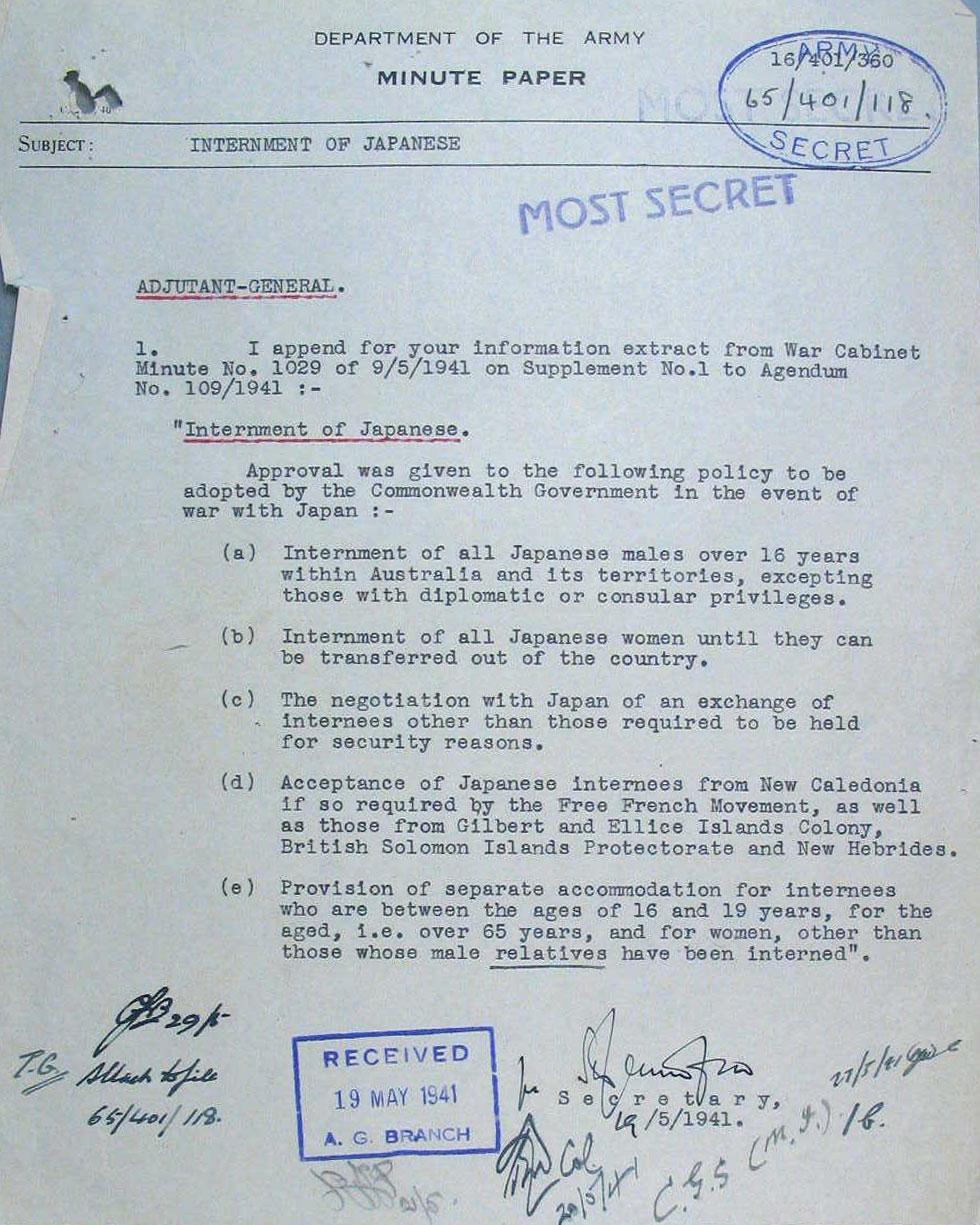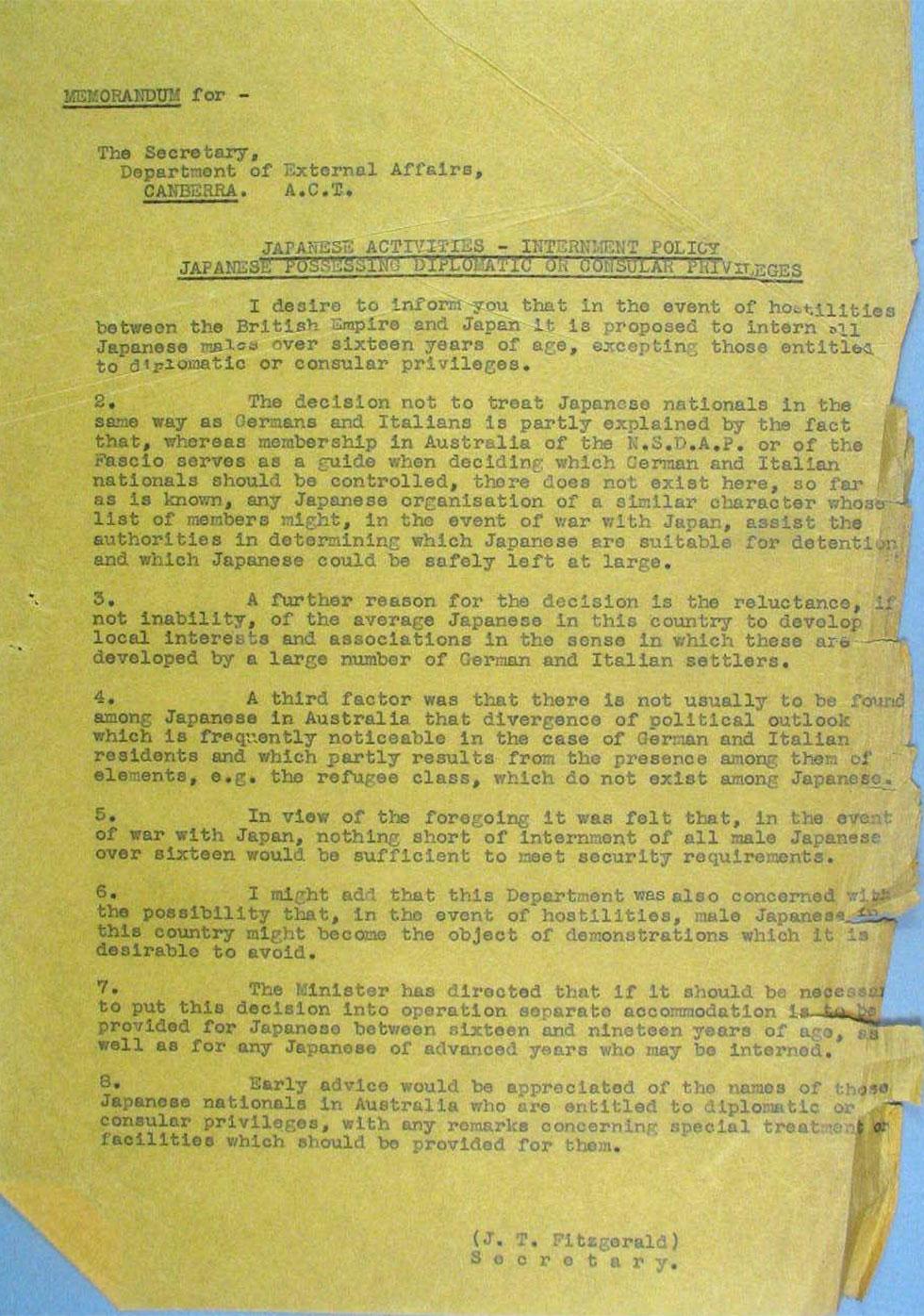

Aboriginal and Torres Strait Islander people should be aware that the National Archives' website and collection contain the names, images and voices of people who have died.
Some records include terms and views that are not appropriate today. They reflect the period in which they were created and are not the views of the National Archives.



[Page 1]
DEPARTMENT OF THE ARMY
[Bold] MINUTE PAPER
[Dividing line.]
SUBJECT: INTERNMENT OF JAPANESE
[Dividing line.]
[Oval shaped stamp in blue ink reads ‘ARMY SECRET’ with numbers typed inside that read ‘16/401/360. Handwritten in black ink are the numbers ‘65/401/118.’ Stamped across this in faint blue ink is ‘MOST SECRET’.]
[Stamp in blue ink:] MOST SECRET
[Underlined in red ink:] ADJUTANT-GENERAL.
1. I append for your information extract from War Cabinet Minute No. 1029 of 9/5/1941 on Supplement No. 1 to Agendum No. 109/1941 :-
[Underlined in red ink:] “Internment of Japanese.
Approval was given to the following policy to be adopted by the Commonwealth Government in the event of war with Japan :-
(a) Internment of all Japanese males over 16 years within Australia and its territories, excepting those with diplomatic or consular privileges.
(b) Internment of all Japanese women until they can be transferred out of the country.
(c) The negotiation with Japan of an exchange of internees other than those required to be held for security reasons.
(d) Acceptance of Japanese internees from New Caledonia if so required by the Free French Movement, as well as those from Ellice Islands Colony, British Solomon Islands Protectorate and New Hebrides.
(e) Provision of separate accommodation for internees who are between the ages of 16 and 19 years, for the aged, i.e. over 65 years, and for women, other than those whose male [word underlined] relatives have been interned”.
[Handwritten signature in black ink, illegible.]
Secretary,
19/5/1941.
[handwritten signature in different hand, illegible, followed by date ‘20/5/41’.]
[handwritten initials in different hand read ‘C.G.S (M.Y.) IG. 27/5/41 [initials illegible].]
[Rectangular stamp in blue ink, reads:] RECEIVED 19 MAY 1941 A.G. BRANCH
[handwritten signature, illegible with date ‘21/5’.]
[handwritten note in black ink reads:] [Initials, illegible] 29/5
[handwritten not in black ink, different hand, reads:] T.G. [initials underlined twice] Attach to file 65/401/118.
[Page 2.]
[Paper is yellow colour, with a tear in top left corner. The right side of the page is damaged, with rips along the length. Most text is still visible.]
[Word underlined] MEMORANDUM for –
The Secretary,
Department of External Affairs,
[word underlined] CANBERRA. A.C.T.
[Heading underlined] JAPANESE ACTIVITIES – INTERNMENT POLICY JAPANESE POSSESSING DIPLOMATIC OR CONSULAR PRIVILEGES
I desire to inform you that in the event of hostilities between the British Empire and Japan it is proposed to intern all Japanese males over sixteen years of age, excepting those entitled to diplomatic or consular privileges.
2. The decision not to treat Japanese nationals in the same way as Germans and Italians is partly explained by the fact that, whereas membership in Australia of the N.S.D.A.P. or of the Fascio serves as a guide when deciding which German and Italian nationals should be controlled, there does not exist here, so far as is known, any Japanese organisation of a similar character whose list of members might, in the event of war with Japan, assist the authorities in determining which Japanese are suitable for detention and which Japanese could be safely left at large.
3. A further reason for the decision is the reluctance, if not inability, of the average Japanese in this country to develop local interests and associations in the sense in which these are developed by a large number of German and Italian settlers.
4. A third factor was that there is not usually to be found among Japanese in Australia that divergence of political outlook which is frequently noticeable in the case of German and Italian residents and which partly results from the presence among them of elements, e.g. the refugee class, which do not exist among Japanese.
5. In view of the foregoing it was felt that, in the event of war with Japan, nothing short of internment of all male Japanese over sixteen would be sufficient to meet security requirements.
6. I might add that this Department was also concerned with the possibility that, in the event of hostilities, male Japanese [in] this country might become the object of demonstrations which it is desirable to avoid.
7. The Minister has directed that if it should be necessary to put this decision into operation separate accommodation in to be provided for Japanese between sixteen and nineteen years of age, as well as for any Japanese of advanced years who may be interned.
8. Early advice would be appreciated of the names of those Japanese nationals in Australia who are entitled to diplomatic or consular privileges, with any remarks concerning special treatment or facilities which should be provided for them.
(J.T. Fitzgerald)
Secretary.
I desire to inform you that in the event of hostilities between the British Empire and Japan it is proposed to intern all Japanese males over sixteen years of age, excepting those entitled to diplomatic or consular privileges.
Shown here are two pages from a record about the decision to intern Japanese Australians during the Second World War. Internment is when a person, often a civilian, is imprisoned for political or military reasons.
The first page is a defence minute paper stamped with 'MOST SECRET' that details the decision made by Cabinet, including who would be interned ‘in the event of War with Japan'.
The second page is a memorandum that gives further details about why the government came to their decision. It states that they 'felt that, in the event of war with Japan, nothing short of internment of all male Japanese over sixteen would be sufficient to meet security requirements'.
Japan and Australia stayed on good terms for the first 2 years of the Second World War. However, on 7 December 1941, Japan attacked Pearl Harbor. Pearl Harbor housed an important U.S. Navy base in Hawaii. Japan’s surprise bombing of the harbour was aimed at weakening the British allied forces and securing oil reserves.
As Australia was a member of the allied forces and geographically close to Japan, prime minister John Curtin declared Australia at war with Japan on 8 December 1941.
These documents from May 1941 reveal that the Australian government had planned the decision to intern Japanese people in the event of war well before the attack on Pearl Harbor took place. Their decision came into effect immediately when war against Japan was declared.
All Japanese men in Australia over the age of 16 were placed in internment camps. Records show that most younger teenager boys, women and children were also interned in Australia during the Second World War.
The Australian government was concerned about the possibility of spies passing information to the Japanese government. The memorandum above argues that internment was necessary because there was no membership group that could reliably 'assist the authorities in determining which Japanese are suitable for detention and which Japanese could be safely left at large'. They were also concerned about the possibility of 'demonstrations' among the Australian public if they saw persons who looked to be of Japanese ancestry in the community.
The decision resulted in several thousand people of Japanese ancestry being imprisoned at 3 main internment camps across the country; Loveday in South Australia, Hay in New South Wales and Tatura in Victoria. Some civilians were also sent to the camp at Cowra in New South Wales. Thousands of people of European descent were also interned during the Second World War. They were mostly of German and Italian backgrounds and were sent to different internment camps, such as Orange in New South Wales.
Imagine that you are a minister present at the war cabinet meeting referred to in these records. What arguments for and against interning civilians might you have heard?
Learn how to interpret primary sources, use our collection and more.
